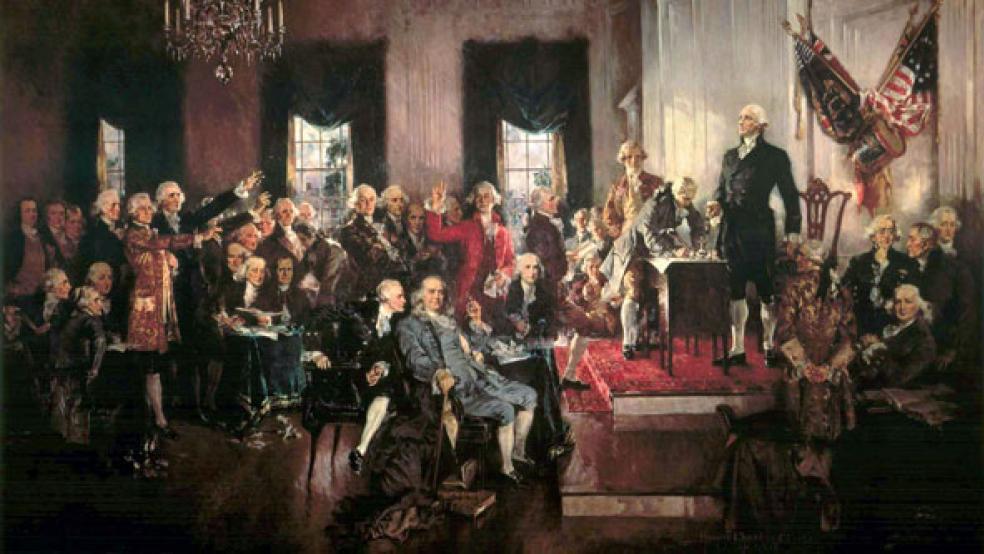Marco Rubio, a Florida senator and one of the leading candidates for the Republican presidential nomination, believes the last best hope for taking power away from Washington, DC and restoring it to the people of the United States is to call a Constitutional Convention of the states via Article V of the existing Constitution. (For more detail on Rubio’s plan, see our report.)
Article V is the element of the nation’s founding document that allows for Constitutional amendments. In addition to creating a mechanism for Congress itself to propose amendments, Article V allows the legislatures of the various states to ask for a convention, stipulating that if sufficient states request one, Congress “shall” convene one.
Related: Marco Rubio Calls for a Constitutional Convention – That’s Problematic
But while the process sounds simple, it’s actually fraught with major questions. Here are the answers to a few of them.
How many states must request a convention in order for Congress to be required to convene one?
The framers of the Constitution wanted to give the various states the ability to check a runaway federal government, but for obvious reasons they also didn’t want the Constitution to be rewritten at the drop of a hat.
So, the bar is pretty high to force Congress’s hand. Two-thirds of the states must request a convention before one will be called. At the time of the drafting of the Constitution, that effectively meant nine of the 13 original states had to be on board. In modern time, it means 34 state legislatures have to make the request.
In the history of the United States, there has never been a successful call for a convention, though around 400 applications have been filed by different states since 1789. The effort came close twice. Concern over a Supreme Court ruling on the apportionment of Congressional voting rights drove an effort that fell one state short in the 1960s. A call for a balanced budget amendment in the 1970s and 80s came within two states of establishing a convention.
Related: $22 Billion in Savings from Cutting Ridiculous Regulations
If a present-day call for a convention were driven by purely partisan politics, the Republican Party, which controls a large majority of state legislatures, would be very close to the threshold. Currently, Republicans have full control of the legislatures of 31 U.S. states, while the Democrats control only 11. Control is split in the remaining eight states. If Republicans took control of three more states, it might create the conditions for a successful convention request.
What role would the Congress have?
There is broad consensus among legal authorities that Congress would play very little role at all beyond making a pro forma call for a convention. The framers who demanded a provision allowing for a state-led effort to amend the Constitution wanted it because they were afraid that once it was established, the federal government in general, and Congress in particular, would take too much power for itself.
For that reason, they argue, the word “shall” is used to describe Congress’s role in calling a convention, because it removes Congressional discretion from the process. Article V also makes no mention of a Congressional role in the convention itself once it has been convened.
Related: Bush Targets 'Big Government' with Plan to Reduce Federal Workforce
What role would the President have?
None. The executive branch isn’t even mentioned in Article V.
What role would the Judicial Branch have?
Like the Executive Branch, the Judicial Branch is not mentioned at all in Article 5. It may be for that reason that various Supreme Court justices have viewed the prospect of a constitutional convention with a certain degree of horror. “I certainly would not want a constitutional convention,” said Justice Antonin Scalia. “Whoa! Who knows what would come out of it?”
Who would set the rules of the convention?
There is no mention in Article V of the way a convention would operate, so the prevailing thinking is that it would have to adopt its own rules, much as the delegates to the original constitutional convention did in 1787.
Related: Sanders' Big Spending Plans Would Reinvent the U.S.
Who would set the limits on the convention?
This is one of the thorniest questions about a Constitutional convention. Marco Rubio appears to believe that the convention could be limited in its scope to “ideas that reduce the size and scope of the federal government, such as imposing term limits on Congress and the Supreme Court and forcing fiscal responsibility through a balanced budget requirement.”
One prevailing theory is that the states themselves could limit the scope of the convention by specifying in their original requests to Congress that the subject matter be constrained to certain areas. However, there are strong arguments against the claim that there could be an effective limit on the convention once it was convened.
Writing in the Harvard Journal of Law and Public Policy, James Kenneth Rogers notes, “It would be difficult for any governmental body to enforce a limitation on the convention, especially given that a constitutional convention, once created, could conceivably claim independent authority as a separate constitutionally authorized body.”
Related: How a Government Data Blunder Made the Economy Look Worse
What would have to happen for any proposed changes to actually become part of the Constitution?
The requirement in Article V is that even if a Constitutional convention approves changes to the founding document – something that could theoretically be done with support of as few as 26 states if the rules of the convention allowed a majority vote – they would still have to be ratified by the legislatures of three-quarters of the individual states.
That’s an even higher bar than the two-thirds majority needed to call a convention, requiring 38 state legislatures to vote in favor.





